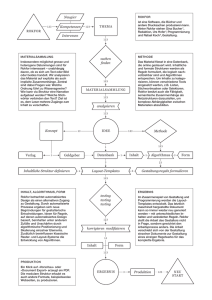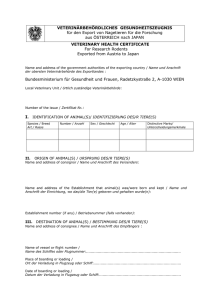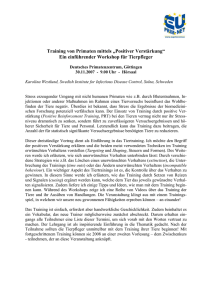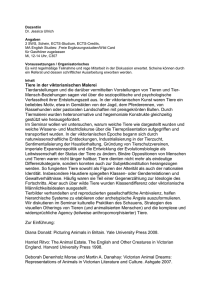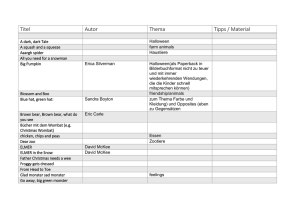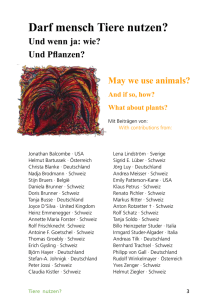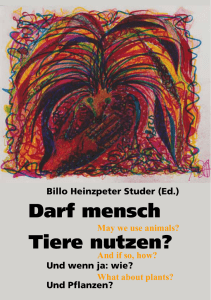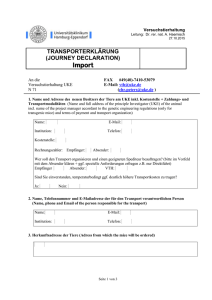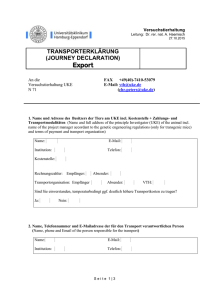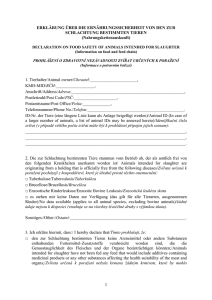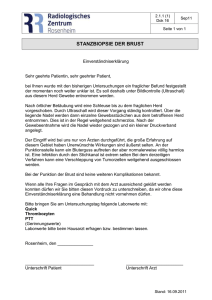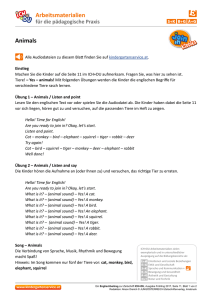Es scheint uns dass die Mehrheit der Alpaca/Lama Besitzer komplett
Werbung
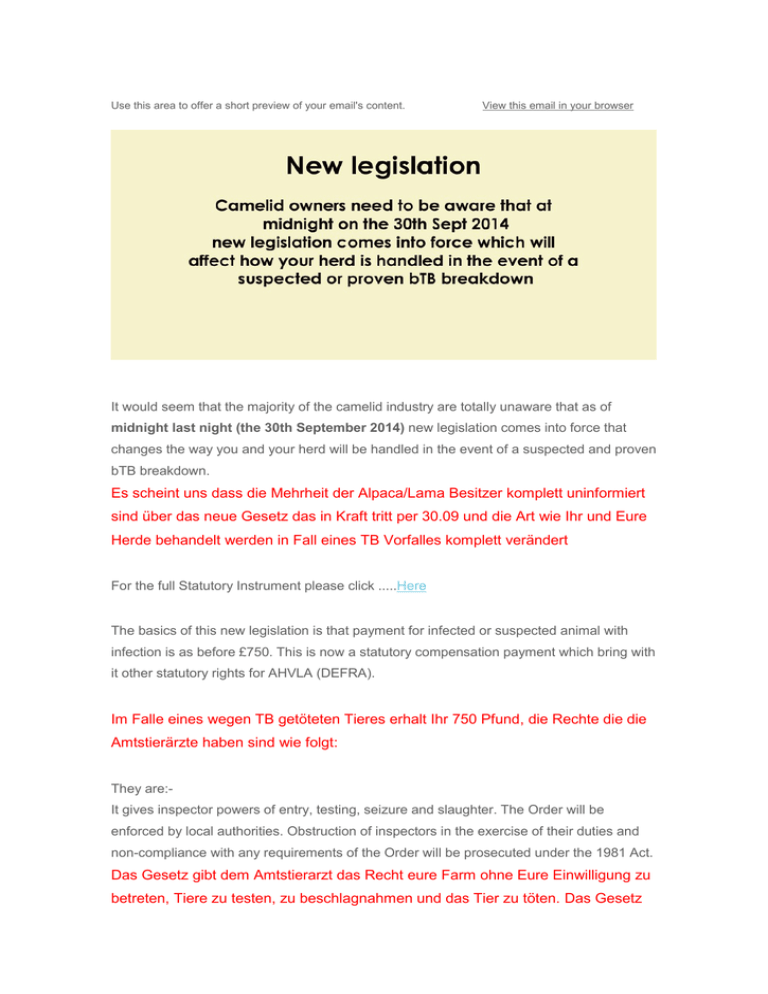
Use this area to offer a short preview of your email's content. View this email in your browser It would seem that the majority of the camelid industry are totally unaware that as of midnight last night (the 30th September 2014) new legislation comes into force that changes the way you and your herd will be handled in the event of a suspected and proven bTB breakdown. Es scheint uns dass die Mehrheit der Alpaca/Lama Besitzer komplett uninformiert sind über das neue Gesetz das in Kraft tritt per 30.09 und die Art wie Ihr und Eure Herde behandelt werden in Fall eines TB Vorfalles komplett verändert For the full Statutory Instrument please click .....Here The basics of this new legislation is that payment for infected or suspected animal with infection is as before £750. This is now a statutory compensation payment which bring with it other statutory rights for AHVLA (DEFRA). Im Falle eines wegen TB getöteten Tieres erhalt Ihr 750 Pfund, die Rechte die die Amtstierärzte haben sind wie folgt: They are:It gives inspector powers of entry, testing, seizure and slaughter. The Order will be enforced by local authorities. Obstruction of inspectors in the exercise of their duties and non-compliance with any requirements of the Order will be prosecuted under the 1981 Act. Das Gesetz gibt dem Amtstierarzt das Recht eure Farm ohne Eure Einwilligung zu betreten, Tiere zu testen, zu beschlagnahmen und das Tier zu töten. Das Gesetz wird von den lokalen Behörden ausgeführt. We are not saying that these new powers are wrong only that you should all be aware of them as it changes you rights as camelid owners. If you need more information please contact the British Alpaca Society I am sorry of you feel this a mis-use of our email system but we at Alpaca and Llama Care feel you should all be aware of these changes as it would seem the majority of you are unaware of them. Also don't forget that as the seasons change and the weather gets wetter it is time to think about Coccy in your cria and possibly in your adults as well as liver fluke throughout your herd if you are in a fluke area or you and your vet suspect you might need to do it. Vergesst nicht dass das Wetter sich ändert und es Zeit wird sich um Kokzidien in den Crias und um Leberegel (Klein) in der Herde zu kümmern. This is a basic copy of the leaflet that DEFRA have produced..... Das ist ein Auszug aus dem Papier das die Defra herausgegeben hat Tuberculosis (TB) can be spread by the movement of apparently healthy but infected animals between herds. If you are thinking about buying alpacas or llamas TB kann verbreitet werden beim Verbringen von vermeintlich gesunden aber infizierten Tieren zwischen Herden. Wenn Ihr drüber nachdenkt Alpacas oder lamas zu kaufen: Check on the TB history of the herd you are buying from. kontrolliert die TB Vergangenheit der Herde wo Ihr kauft Think very carefully about biosecurity arrangements for your new animals, especially if you keep them in the bovine TB high risk ‘endemic’ area (e.g. the South West and the West Midlands). Denkt sehr sorgfältig über die Biosicherheit für Eure neuen Tiere nach insbesondere wenn Ihr sie in einer TB Hochrisikozone haltet (Südwest und midlands) For all alpaca and llama owners Consult your vet if in doubt about the health of your animals Tierarzt konsultieren wenn ihr Zweifel habt ob die Tiere gesund sind Arrange for a post-mortem examination of any animals that die of unexplained causes Wenn ein Tier unerwartet stirbt sezieren lassen! Undertake voluntary TB testing of your animals regularly Regelmäßige TB Tests für die Herde If your animals move, or animals come to your property, check their TB status and test them if appropriate Wenn Ihr Tiere bewegt oder Tiere zu Eurer Farm kommen überprüft den TB Status und lasst sie testen wenn nötig If TB is suspected: If a suspect clinical case of TB is reported in a herd of camelids that are not under movement restrictions, Defra would recommend examination by a private veterinary surgeon in the first instance, with referral to the Animal Health and Veterinary Laboratory Agency (AHVLA – details for local offices are in the phone book) if TB cannot be ruled out in the animal(s) in question. If an AHVLA Veterinary Officer also suspects TB, the herd will be placed under precautionary movement restrictions and the animal will undergo skin and blood testing at government expense under a formal notice of testing. Two combined antibody (blood) tests will be used by AHVLA and an animal removed if it is positive to either test (parallel interpretation). This provides a higher sensitivity of infection detection (81%) that cannot be obtained with any single test alone. Auszug: Wenn der Amtstierarzt Verdacht hegt wird auf Regierungskosten ein Blut und ein Hauttest gemacht, zwei Antikörpertests sowie ein Hauttest werden gemacht das Tier jedenfalls getötet wenn ein Test positiv ist. Prevent it: Owners can help protect themselves and their animals against TB by undertaking voluntary surveillance of their herd. Camelid owners whose herds are not under TB movement restrictions from AHVLA may submit blood samples privately for testing at their own expense. AHVLA can offer high specificity (99.7%) testing to minimise any chances of false positive results using a combination of two (blood) antibody tests in serial interpretation (i.e. an animal must fail both tests to be considered infected). Similar high specificity testing is being offered by other laboratories, and it is for the owner to choose which to use. Details of who to contact for further information and where to submit blood samples to for private TB testing of camelids can be found on the back page of this leaflet. If it moves, test it: Alpacas and llamas move to and from premises to attend: Shows; Markets; For trekking or breeding; or Following sales These are perceived by livestock farmers to increase the risk of the spread of TB to their animals. To protect your herd and reassure your neighbours and customers, you should consider TB testing your own animals before they move; and being sure that animals visiting your premises have already been tested (premovement testing). You can also have any incoming animals privately tested after arrival onto your farm (post-movement testing). Auszug: Wenn Tiere bewegt werden testet sie! Alpacas werden überlicherweise bewegt: Shows Märkte Trekking oder Decken Verkauf Das sind die hauptsächlichen Risiken die in Kauf genommen werden und das Risiko TB zu verbreiten erhöhen Um das Risiko für Eure Herde und die Eurer Nachbarn gering zu halten solltet Ihr darüber nachdenken Eure Tiere testen zu lassen bevor Ihr sie bewegt und stellt sicher dass nur getestete Tiere auf Euren Hof kommen, Sollte die nicht der Fall sein testet sie jedenfalls nach Ankunft Further information about the voluntary bTB surveillance schemes available for camelid can be obtained from: BAS: www.bas-uk.com BLS: www.britishllamasociety.org Camelid TB Support group: www.alpacatb.com
